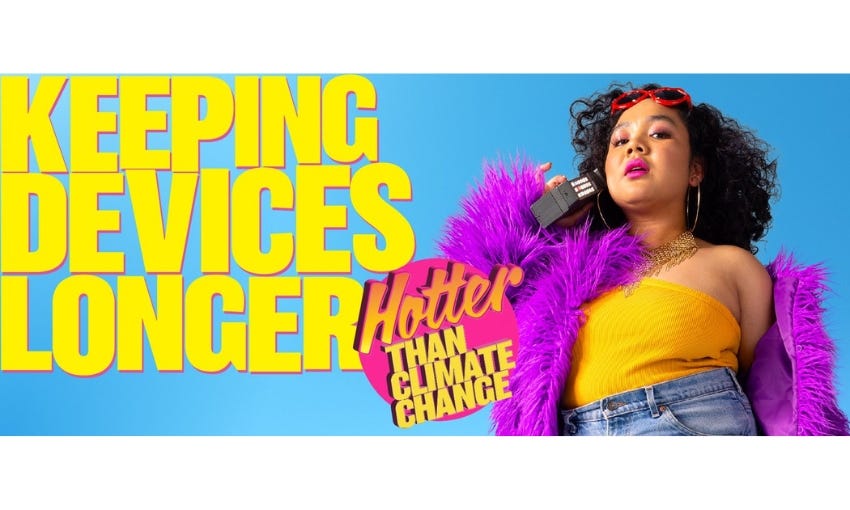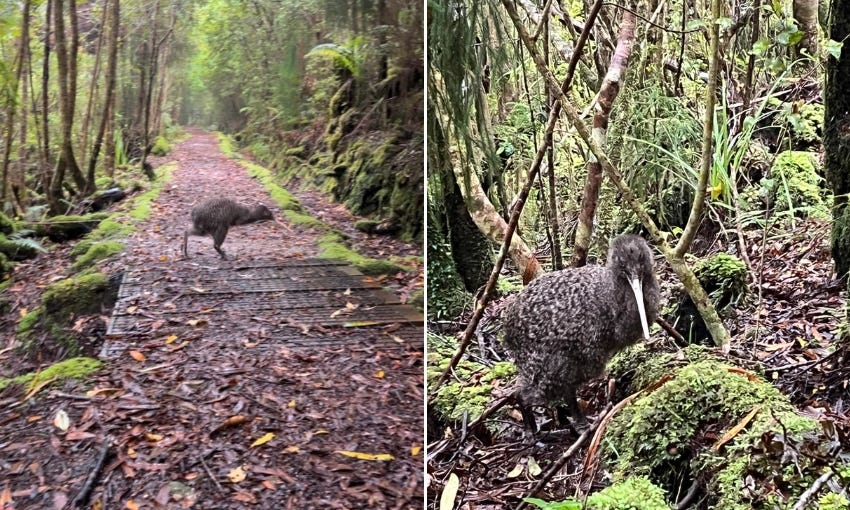Seven lifestyle shifts you can make for the climate
Take the jump for the International Day of Climate Action.
Kia ora, welcome to Future Proof. Thanks for joining me. This week: kiwi on the Heaphy, and what on earth is ring-net fishing? But first: tomorrow is International Day of Climate Action, so maybe it’s time to Take the Jump.
Image credit: Take the Jump.
“What’s the point of me doing anything?”
It’s a question Chris Wheatley, Deputy Co-Chair of the Nelson-Tasman Climate Forum, hears a lot when it comes to climate action, and he gets it. In the face of giant corporations, a lone person’s efforts can feel insignificant. But, he points out, personal decisions can achieve 25–27% of the emissions reductions we need to keep warming within reasonable limits, according to scientific evidence.
That’s why he wants to change that feeling of powerlessness and get people to take the jump into climate action.
Wheatley leads the New Zealand arm of Take the Jump Kia Māia Te Peke, a “joyous people-led movement” for climate action. Originating in the UK and borne out of a scientific analysis of what climate actions are most impactful, Take the Jump encourages participants to try out seven lifestyle shifts:
Keep your electronic devices for at least seven years
Holiday local, and be strategic when booking flights
Walk, bike, carpool or take public transport
Eat green: more plant-based, local food
Get involved in native planting
Shop secondhand
Make a “system” change
That last one relates to the “bigger picture”, says Wheatley. Think switching your Kiwisaver to a more climate-friendly fund, or checking your energy provider’s renewable creds, or making submissions on government policy. A meatier task to tackle.
Signing up to Take the Jump for a couple of months, or however long you choose, will line up a sequence of emails with heaps of supporting info for making those lifestyle shifts. The most important part is just giving it a go. “Trying is enough, so just get started, do something,” says Wheatley.
He emphasises that this movement “doesn’t mean going back to living in a cave.” Instead, it’s about “less stuff, more joy”. People often find they’re spending more time with friends and family, and making new social connections, once they take the jump, Wheatley says. He’s made changes in his own life: cycling and taking the bus more, only eating meat that’s been hunted in the wild, and thrifting his clothes at the op shop.
But it’s not about preaching, or judging, if others don’t take the same climate action path as you. The movement is fiercely anti-shaming, and supports balance rather than abstinence. “We’re all hypocrites, right? No one is perfect in this. Everything you can do that’s positive, that counts,” he says.
In Nelson-Tasman, where Take the Jump has sprouted, there’s “a social network and a real vibe” that has developed among participants. A second regional group has cropped up in Wairarapa, and ambassadors are now present in Wellington, Auckland and Christchurch. A webinar on Thursday 24 October hopes to reel in more folks from across Aotearoa keen to take the jump.
Ultimately, it’s about reaching a critical mass for a social tipping point. “Think 30 years ago, smoking was common everywhere,” says Wheatley. “Today, if you were to suggest going back to smoking on planes or in restaurants, that would be beyond the pale. Attitudes have changed, but it didn’t take everybody to change.” That’s the aim: enough individuals taking the jump to create a splash big enough to generate climate action ripples.
Watch: Home Education, episode three
Episode three introduces Irma, who left her career as a chartered accountant to home educate her two sons. When her eldest son was attending school, his love for ballet became an open secret. But now, “you don’t have to hide,” says Irma, who feels her children’s formative years are too precious to miss. Irma now fields questions like “does space have a bottom?” following Montessori and Unschooling education principles. Made with the support of NZ On Air.
Environment Committee reports back on Fast-track
The Environment Select Committee delivered its official recommendations for the controversial Fast-Track Approvals Bill on Friday. RNZ’s Kate Green summarises the recommendations, and canvasses ongoing opposition from environmentalists who say the bill still lacks basic environmental protections and opportunities for public consultation.
The list of 149 fast-track projects has continued to garner scrutiny over the last two weeks, with RNZ’s Farah Hancock revealing that 12 projects are associated with $500k in political donations. For an overview of what’s on the list, The Spinoff’s Toby Manhire recreates the retro Tour of New Zealand board game, fast-track style, and Newsroom has an interactive map. Elsewhere, New Zealand Geographic’s Rebekah White asks what the point of the bill is: “it isn’t clear why particular projects have been chosen, and the list has a somewhat garage-sale vibe to it.”
Last-minute changes to Hauraki Gulf marine protection stir up a stink
A last-minute change announced by Minister of Conservation Tama Potaka will allow commercial ring-net fishing in two new high protection areas in Tīkapa Moana the Hauraki Gulf. The Spinoff’s Gabi Lardies explains why the decision has riled environmentalists. New Zealand Geographic’s James Frankham also has some interesting commentary on the decision and what ring-net fishing entails. Raewyn Peart from the Environmental Defence Society reckons that given how long it took to wrangle more marine protection for the Gulf, we should take a pragmatic view and see the imperfect bill as a positive start.
The hidden battery in your home
What if your hot water cylinder could help solve New Zealand’s energy crisis? And how is an hour of free electricity helping with our notoriously problematic electricity market? Electric Kiwi co-founder and CEO Huia Burt sits down with Bernard Hickey on When the Facts Change.
Join us for a one-night only live event
We’re huge fans of local television here at The Spinoff, and for one night only we want to celebrate some of our all-time faves. Join Alex Casey, Kura Forrester, Rhiannon McCall, Stewart Sowman-Lund and Lyric Waiwiri-Smith at Q Theatre on October 31 as we unearth some beloved TV gems and argue for their place in our history.
More stories
Liam Rātana meets a group on a mission to restore toheroa along New Zealand’s second-longest beach. (The Spinoff)
The nationally significant Whangamarino wetland is on fire. This isn’t just bad news for wildlife – two previous peat wetland fires in 2022 released half a million tonnes of carbon dioxide. (RNZ)
Car lanes in the city are stuffing up Wellington, writes Joel McManus. (The Spinoff)
With its last coal-fired power plant shuttered, the UK’s dirtiest form of power is now incinerating rubbish. (BBC)
Biochar isn’t just a carbon storage tool. Researchers have now found it can also filter microplastics from farm soil. (Anthropocene Magazine)
Are whitetail spiders actually dangerous? Hera Lindsay Bird investigates. (The Spinoff)
There’s no global warming time machine: temporarily overshooting 1.5°C of warming and then using carbon removal tech to restore a lower global temp might be a fool’s errand. (The Conversation)
Disruptive climate protests can raise support for mainstream environmental groups, new research suggests. (Nature)
What will the climate be like in your city in 60 years? An interactive map. (University of Maryland)
Join our community of supporters
"I like that it feels like chipping in for a good cause, rather than paying for a subscription." - Kimberley, Spinoff member.
Whether you read, listen to or watch our mahi, you can support us to do more by donating today or signing up to become a member. Already a member? Ka nui te mihi, your support means the world to us.
Image credit: Department of Conservation.
Last week was Save the Kiwi week, a chance to celebrate our national icon. Along the Heaphy Track in Kahurangi National Park, sightings of the nationally vulnerable roroa great spotted kiwi are increasing thanks to predator control, according to the Department of Conservation. These snaps were captured by trampers along the Great Walk.
Keep calm and kiwi on,
Ellen
Future Proof is looking for a sponsor!
Connect your brand with an insightful exploration of environmental news, reaching influential readers committed to sustainability and staying informed about the state of our natural world. Contact commercial@thespinoff.co.nz to learn more.
Got some feedback about Future Proof or topics you’d like covered? Get in touch with me at futureproof@thespinoff.co.nz












